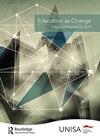在南非新冠肺炎封锁期间的在线学习:大学生们放任自流
IF 1
4区 教育学
Q3 EDUCATION & EDUCATIONAL RESEARCH
引用次数: 0
摘要
2020年3月南非宣布全国封锁后,大学生和讲师不得不在网上进行学习活动。在拥有可靠信息和通信技术的国家,这种过渡相对顺利。学生能够使用基于互联网的在线学习系统进行学习。南非的情况并非如此。本文通过对一些学生和讲师的深入采访以及互联网资源的使用,表明贫困家庭和工薪阶层学生的参与存在许多不足。这是因为南非的信息和通信技术基础设施对贫困和工薪阶层家庭不利。来自工人阶级和贫困家庭的学生在网上学习的机会很差,这表明在南非,关于第四次工业革命的承诺的论点根本站不住脚,也没有任何证据支持。相反,正如本文所述的事实所表明的那样,许多工薪阶层和贫穷的南非人甚至没有意识到包括信息和通信技术在内的第三次工业革命的假定好处。对于参与这项研究的学生来说,糟糕的信息和通信技术基础设施以及与使用笔记本电脑和电脑有关的挑战使封锁期间的在线学习变得非常困难。本文章由计算机程序翻译,如有差异,请以英文原文为准。
Online Learning during the South African Covid-19 Lockdown: University Students Left to Their Own Devices
After the announcement of a national lockdown by the South African state in March 2020, university students and lecturers had to conduct learning activities online. In countries where reliable information and communications technologies exist, this transition was relatively smooth. Students were able to learn using internet-based online learning systems. This is not the case in South Africa. Based on in-depth interviews with some students and lecturers and the use of internet resources, this article demonstrates that the participation of students from poor and working-class households evinced many deficiencies. This is because South Africa’s information and communications technology infrastructure disadvantages poor and working-class households. The poor access to online learning that students from working-class and poor households experienced demonstrates that in South Africa the argument about the promise of the Fourth Industrial Revolution, which must supposedly be embraced by everyone, is simply not tenable and is not supported by any evidence. Instead, many working-class and poor South Africans, as shown by facts presented in this article, have not even realised the assumed benefits of the Third Industrial Revolution, which comprises information and communications technologies. For the students who participated in this study, poor information and communications technology infrastructure and the challenges pertaining to access to laptops and computers made online learning during the lockdown very difficult.
求助全文
通过发布文献求助,成功后即可免费获取论文全文。
去求助
来源期刊

Education As Change
EDUCATION & EDUCATIONAL RESEARCH-
CiteScore
1.40
自引率
0.00%
发文量
29
审稿时长
24 weeks
期刊介绍:
Education as Change is an accredited, peer reviewed scholarly online journal that publishes original articles reflecting critically on issues of equality in education and on the ways in which educational practices contribute to transformation in non-formal, formal and informal contexts. Critique, mainly understood in the tradition of critical pedagogies, is a constructive process which contributes towards a better world. Contributions from and about marginalised communities and from different knowledge traditions are encouraged. The articles could draw on any rigorous research methodology, as well as transdisciplinary approaches. Research of a very specialised or technical nature should be framed within relevant discourses. While specialised kinds of research are encouraged, authors are expected to write for a broader audience of educational researchers and practitioners without losing conceptual and theoretical depth and rigour. All sectors of education are covered in the journal. These include primary, secondary and tertiary education, adult education, worker education, educational policy and teacher education.
 求助内容:
求助内容: 应助结果提醒方式:
应助结果提醒方式:


